Healthcare in Canada: Full Guide for Immigrants
Home » Life in Canada: All Immigrants Need to Know This » Healthcare in Canada: Full Guide for Immigrants
How Does the Canadian Healthcare System Work?
The Canadian healthcare system is a decentralized, publicly funded system that allows universal healthcare access. The government sets the rules for the design, but provinces and territories decide how to make those rules work in their communities.
The primary responsibility for providing health services within Canada lies with provincial governments. The federal government provides funding to provinces and territories through transfers.
The amount of money each section receives depends on:
- how many people live there,
- how much they earn,
- whether they have any particular needs, such as mental health or addiction services.
Each province has its plan for delivering health services to its citizens. For example, it decides which hospitals should provide what kind of care and where those facilities should be located. It also determines how much it wants to spend on hospitals and other healthcare providers each year based on its population size and budget needs.
Provinces typically fund their programs through taxes on all residents within their borders.
Quick Links:
☑️ Who is Eligible for Healthcare in Canada?
Something you should know about life in Canada… The Canadian healthcare system is designed for everyone, regardless of age or income. To be eligible for the Canadian Healthcare System, you must be a Canadian citizen, permanent resident, or a temporary resident with a valid work or study permit. Additionally, refugees and asylum seekers are also eligible for healthcare services in Canada.
All of the said eligible clusters are required to be physically present in Canada at the time of your application and be mentally capable of making decisions about your healthcare.
Canadian citizens and permanent residents are eligible for the Canadian Healthcare System.
If you are already a citizen or permanent resident of Canada, then you will automatically be eligible for healthcare under the Canadian provincial health insurance plan.
Permanent residents are eligible for healthcare services as soon as they arrive in Canada. After you have been accepted as a permanent resident, you must complete medical testing and pass the test with flying colors before you can be considered eligible for healthcare. However, they need to wait for a specified period, which varies from province to province, before they can avail of certain services.
Temporary residents in Canada, such as international students or workers, are also eligible for healthcare services. However, they need to have a valid work or study permit, and their healthcare coverage may vary depending on the province or territory they are residing in.
Refugees and asylum seekers in Canada are eligible for healthcare services from the moment they arrive in Canada. The Interim Federal Health Program (IFHP) provides coverage to refugees and asylum seekers until they become eligible for provincial or territorial healthcare.
📩 How to Access Canada's Health Care as an Immigrant? 3 Options
Apply for a Canada Health Card
This card is free and can be obtained at any Canadian doctor’s office or hospital, is a proof that you are legally entitled to medical services in Canada.
Get provincial health insurance coverage
You can get it through your employer or the government. If you are working or receiving social assistance in Canada, your employer may be required by law to provide some level of coverage. If not, you can buy provincial health insurance outside work hours.
Get public insurance coverage through the provincial government
If you have a valid work visa (such as a study visa) and cannot get an employer-sponsored plan, then you may also be eligible for public insurance coverage through the provincial government.
🏥 What Services are Covered Under Healthcare in Canada?
The Canadian Healthcare System provides coverage for various medical services, including hospital services, medical services, dental services, prescription medication, vision care, mental health services, and home care services.
Provincial and territorial governments provide healthcare coverage to all residents, including children and seniors. In some provinces and territories, different levels of coverage may be available depending on age or income level.
Some provinces have universal health insurance systems that provide primary coverage for everyone regardless of their health status or where they live.
In addition, healthcare system in Canada offers a wide range of services for patients and their families. These services include:
Hospital Services
Hospital services in Canada are publicly funded and provide free-of-charge treatment to all eligible residents. This includes emergency services, in-patient care, and outpatient services. However, elective procedures and services such as cosmetic surgery are not covered by the Canadian Healthcare System.
Medical Services
Medical services covered by the Canadian Healthcare System include visits to doctors, specialists, and diagnostic services such as X-rays and lab tests. The Canadian Healthcare System covers a broad range of medical services, including preventative care, diagnosis, and treatment of acute and chronic illnesses.
Dental Services
Dental services are not covered by Canada’s Healthcare System, except for some emergency dental procedures performed in hospitals. This means that immigrants need to purchase private dental insurance or pay out of pocket for dental services.
Prescription Medication
Prescription medication coverage in Canada varies from province to province. Some provinces provide coverage for prescription medication for eligible residents, while others do not. Immigrants should check with their province’s healthcare system to understand the extent of their coverage.
Vision Care
Vision care is not generally covered by the Canadian Healthcare System. Some provinces may provide coverage for vision care for children, seniors, and low-income individuals. However, immigrants should check with their province’s healthcare system to understand the extent of their coverage.
Mental Health Services
Mental health services are covered by the Canadian Healthcare System. This includes treatment for mental health disorders such as depression, anxiety, and schizophrenia. Mental health services may be provided in hospitals, clinics, or through community-based services.
Home Care Services
Home care services are provided by healthcare professionals in the patient’s home. These services may include nursing care, physical therapy, occupational therapy, and personal care. Home care services are available to eligible residents of Canada.
💸 The Cost of Canadian Healthcare System
The Canadian Healthcare System is publicly funded and provides free-of-charge medical services to all eligible residents. However, there are some costs associated with the Canadian Healthcare System, including out-of-pocket expenses, private healthcare insurance, and some services that are not covered by the system.
Public Healthcare
Public healthcare in Canada is funded through taxes and is free-of-charge for all eligible residents. However, some services may have associated costs, such as prescription medication or ambulance services.
Private Healthcare
Private healthcare insurance is available in Canada and covers services that are not covered by the system, such as dental care and prescription medication. Private healthcare insurance can be purchased by individuals or provided by employers as part of a benefits package.
Out-of-pocket Expenses
Out-of-pocket expenses may arise when accessing healthcare services in Canada. This may include the cost of prescription medication, medical equipment, or services that are not covered by the Canadian Healthcare System.
❓ Canada’s Healthcare System: FAQs
The Canadian Healthcare System covers a broad range of medical services, including visits to doctors, specialists, diagnostic services, preventative care, and treatment of acute and chronic illnesses.
No, dental services are not covered by the Canadian Healthcare System, except for some emergency dental procedures performed in hospitals.
Immigrants may need to purchase private healthcare insurance to cover services that are not covered by the Canadian Healthcare System, such as dental care and prescription medication.
Temporary residents, such as international students or workers, may need to purchase private healthcare insurance to cover the cost of medical services.
Immigrants can navigate the Canadian Healthcare System by choosing a family doctor, understanding healthcare services, keeping health records, and being aware of the application process for the Canadian Healthcare System.
Even if you don’t have a government health card, the Canadian government offers free emergency medical treatments depending on your immigration status.
You should go to the closest hospital if you have an emergency. A walk-in clinic might charge you if you are not a resident of that province or territory.
All citizens and permanent residents are entitled to free point-of-use hospital and medical treatments.
In addition, provinces and territories offer a certain amount of coverage for specific categories to pay for excluded treatments, such as outpatient prescription medications and dental care.
To qualify for and maintain Canadian health insurance, you must reside in Canada for most of the year.
This usually entails physically spending at least six months each year in Canada. However, it varies a little per province.
These are the advantages that canadian immigrants get:
- Child Benefit Canada (CCB).
- Credit for the goods and services or harmonized sales tax (GST/HST).
- Benefits for the province or territory.
🍁 Conclusion
In conclusion, the Canadian Healthcare System provides publicly funded, free-of-charge medical services to eligible residents. However, immigrants should be aware of the services that are not covered by the system, such as dental and vision care, and may need to purchase private healthcare insurance.
Immigrants should also be familiar with the application process for the Canadian Healthcare System, depending on their immigration status. Finally, understanding healthcare services, keeping health records, and choosing a family doctor are important tips for navigating the Canadian Healthcare System.

